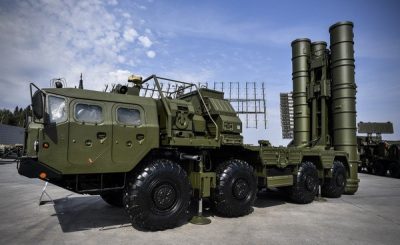Competition in the Weapons Industry. Russia’s S-400s Sold to America’s Allies
Multipolarity. Towards the Emergence of a New "Non-Alligned Movement"

The US is threatening to sanction Russia if it sells its S-400 anti-air systems abroad.
Bob Menendez led a group of lawmakers who wrote to the State Department and asked that last year’s “Countering America’s Adversaries Through Sanctions Act”, or CAATSA, be applied against Russia in the event that it exports its latest state-of-the-art defensive technology. The US is evidently scared of the S-400s because it keenly understands just how strongly they undercut the Pentagon’s strategic air and missile dominance and therefore correspondingly raise the cost of any future military campaign. Simply put, investing in this system is akin to investing in one of the most surefire deterrence policies against American aggression, which is why a wide array of states such as Turkey, Saudi Arabia, Iraq, India, and China are in the process of doing so.
Qatar had previously been in talks with Russia about purchasing these missiles but looks likely to backtrack on this under American pressure, though there’s recently been speculation that Pakistan might be interested in them as a response to the Pentagon suspending military assistance to the South Asian state at the beginning of this year. Altogether, the identifiable pattern is that countries all across the Eurasian Rimland are interested in buying this technology, with the combined effect being that the US might eventually be shut out of the supercontinental Heartland if all of these prospective sales go through, hence the urgency behind why America wants to sanction Russia for selling its S-400s abroad. Inadvertently, however, this frenzy might backfire and become the best endorsement that Russia could have ever hoped for.
In addition, the threat of concerted American pressure against Moscow and its military partners also creates the opportunity for Russia to lead a broad anti-sanctions coalition in developing and expanding alternative financial and other institutions for limiting the damage that the US could do to their interests through CAATSA. As such, this could become the impetus for strengthening the emerging Multipolar World Order and accelerating the transition away from unipolarity, with the case of possible sanctions and sanction-evading measures related to CAATSA and the S-400s being a trial run for the day when Russia inevitably sells its hypersonic missile technology to other countries in giving them an offensive deterrent to pair with their defensive one against American aggression.
Russia’s “military diplomacy” is helping traditional American allies such as Turkey and Saudi Arabia diversify their relations with multipolar Great Powers while retaining pragmatic cooperation with the US, with the end result being that they’re able to more comprehensively chart a more independent foreign policy. This ultimately enables them to become the pioneers of a new Non-Aligned Movement (Neo-NAM) in the New Cold War that strives to attain strategic equidistance between the US and China, which would be impossible to pull off without the pivotal “balancing” role that their relationship with Russia provides. Approached from this perspective, Russia’s S-400 sales are actually a groundbreaking step in the direction of revolutionary geostrategic change, so it shouldn’t be a surprise that the US is reacting as hysterically as it is to this move.
*
Andrew Korybko is an American Moscow-based political analyst specializing in the relationship between the US strategy in Afro-Eurasia, China’s One Belt One Road global vision of New Silk Road connectivity, and Hybrid Warfare. He is a frequent contributor to Global Research.

